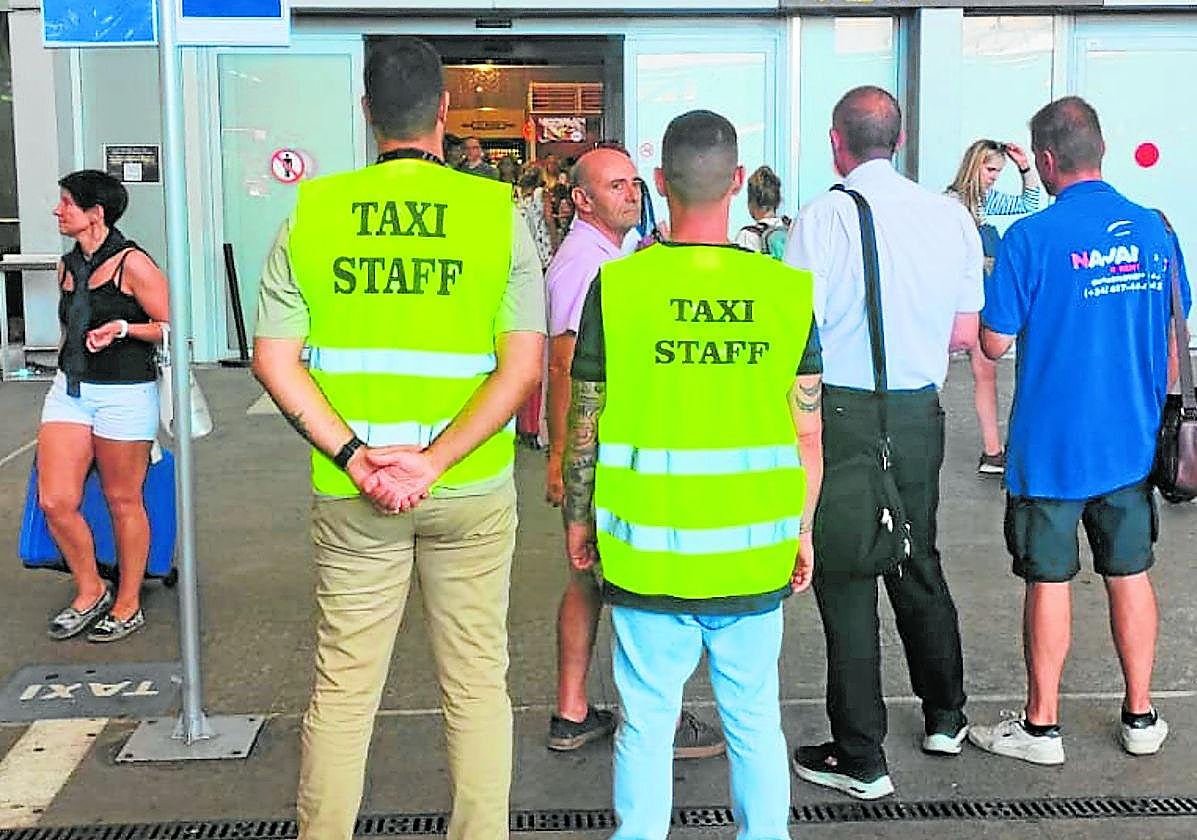Legal taxi drivers unite to fight unlicensed 'pirates' picking up passengers at Malaga Airport
The vigilantes, divided into three shifts covering the gateway to the Costa del Sol, warn tourists that they are about to accept an illegal service
The airport is the most profitable territory for taxi drivers in Malaga. The constant flow of arriving tourists is an important part of their business, especially in summer, coinciding with the high season. A trip from the airport to places such as Marbella, Granada, Algeciras, Gibraltar or even Seville is lucrative business. For some time now, taxi drivers have had to live with the 'pirates' who prowl the airport: unlicensed drivers who try to make a killing in the departures terminal, where they try to attract tourists. They almost always pass themselves off as official taxi drivers and take advantage of the fact that many foreigners do not know how this public service works.
Tired of this situation, after seeing how for a long time they were losing customers on a daily basis, taxi drivers decided to organise themselves to stop these pirates. With this aim in mind, Infotaxi AGP was born. Set up in groups of five or six, divided into three shifts covering the entire airport, they go to the terminal gate, where the pirates used to pick up tourists, and warn people that they are about to accept an illegal service. "Most of them are not even aware and immediately thank us for our work. We show them where the official taxis are," explained Santiago Marín, the taxi driver who came up with the initiative. After two weeks in operation, the conclusion is very positive. "We have managed to displace the pirates and we are preventing them from attracting tourists quite effectively," Marín added.
The direct consequence of this initiative has been an increase in tension between the two sides. According to the taxi drivers' account, perceiving that their business is in danger, the pirates have become more aggressive: threats, insults and attempts at intimidation. "They have even chased me to my house," he said.
Taxi staff claim that 'pirates' threaten them and even chase them to their homes in order to intimidate them
There are many testimonies like that of Santiago Marín, although most of them do not want their full name to be revealed. "I'm not afraid of them, but I don't want them to know my surname either," explains José, a taxi driver who continued in this trade after his father's retirement. He confirms the effectiveness of the work of Infotaxi AGP. "Until now, you were in the queue and if you saw one of these pirates you tried to tell him that what he was doing was illegal, but you couldn't do much more. You had to hurry back to your taxi, which was in the queue," he said.
Now, when the taxi drivers organise themselves into a shift quadrant that covers the whole day, they see, for the first time, how they are draining the work from the pirate taxi drivers. "The colleagues are then compensated with overtime at the airport," he added. The word 'pirates' is an understatement for Jesús. "I would say they are mafiosi. They chase us to our homes to intimidate us. Those are mafia methods. They are very angry because we are taking back what is ours," he said.
Bad image
In addition to the unfair competition that this practice entails, taxi drivers point to the bad image it offers for tourists. If the gateway to the Costa del Sol is the airport, the first experience many get is that of being ripped off. Taxi fares are fixed. The 'pirates', depending on the language spoken by the passenger, change what they will charge. The taximeter does not exist and that means a free hand to arbitrariness.
Vanessa is another taxi driver who has joined this vigilante group, or information group, as she prefers to call it. "Until now, they were free to roam free. They would pick up tourists without anyone doing anything. We used to call the Local Police, but they told us that they couldn't do anything if they didn't catch the pirate drivers when they took someone on board," she said.
Marín is proud of how the first few weeks have gone, although he acknowledges that the 'pirates' "have become more aggressive". To avoid falling into provocations, the Infotaxi AGP group has drawn up a code of good practice. "Whatever happens, we don't engage in provocation or physical violence. It's just what they want. When we see that things are escalating, we call the police," he said.

